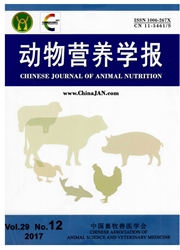

 中文摘要:
中文摘要:
植物乳杆菌作为微生态饲料添加剂饲喂后易受消化道胃酸、胆汁酸和消化酶等不利因 素的影响.泰山松花粉多糖( TPPPS)作为-种水溶性植物多糖也易受到胃酸和酶的破坏.为 了保护植物乳杆菌和TPPPS的生物活性,并探索二者之间是否存在协同作用.本研究以植物乳 杆菌和TPPPS为芯材制备微胶囊,通过正交试验对包埋工艺进行优化,并对最佳条件下制备的 微胶囊进行性能检测.选取体重20 g 左右无特定病原体( SPF)小鼠4 8只,随机分为4组,每组 12只.4组小鼠每天分别口服饲喂1 mL 的植物乳杆菌、植物乳杆菌+0.5% TPPPS、微胶囊、磷 酸盐缓冲液( PBS).饲养试验42 d.每隔1周各组随机取3只小鼠称重记录,剖检后无菌采集 肠道组织,测定小肠绒毛和隐窝发育差异及乳酸菌和大肠杆菌定植情况.结果显示:1)微胶囊 包埋率达81.6%,粒径为84.3 pm.在模拟胃液中处理120 min植物乳杆菌存活率为62.36%, 37 ℃条件下存储120 d 存活率达45.9%.2 )与 PBS组相比,植物乳杆菌、植物乳杆菌+0.5% TPPPS、微胶囊均能不同程度促进小鼠体重增加,提高小肠中乳酸菌数量,降低大肠杆菌数量,改 善小肠绒毛和隐窝发育,微胶囊效果最优.结果提示,植物乳杆菌协同TPPPS使用的益生效果 显著优于单独的植物乳杆菌,二者制备的微胶囊能够进一步提高其益生效果.
 英文摘要:
英文摘要:
Lactobacillus plantarum ( L. plantarum) , as a kind of microecological feed additive, was easy to be affected by adverse factors such as gastric acid, bile acid and digestive enzyme. Taishan pine pollen polysac-charide (TPPPS) was a kind of water soluble plant polysaccharide, which was easy to be damaged by acid and enzyme. In order to protect the biological activity of L. plantarum and TPPPS and to explore whether they have synergistic effect, this experiment prepared microcapsules with L. plantarum and TPPPS as core materials. The microcapsule embedding process was optimized by orthogonal test, and the performance of the microcapsules prepared under the optimum conditions was determined. Forty-eight specific pathogen free ( SPF) mice (weighted about 20 g ) were randomly divided into 4 groups with 12 mice per group. Mice in different groups were orally fed 1.0 mL of L. plantarum, L. plantarum+ 0 . 5 % TPPPS, microcapsules and phosphate buffered saline (PBS) (control group) , respectively. The feeding trial lasted for 42 d . Every other week, three mice from each group were selected randomly and weighed. After autopsy, intestinal tissues were aseptically collect-ed and measured the changes of villi and crypts in the small intestine, and then the colonization of lactic acid bacteria and Escherichia coli were determined. The results showed as fo l low s: 1) encapsulation efficiency of the microcapsules was 81.6% and diameter was 84.3 ( xm. Survival rate of L. plantarum was 6 2 .36% after 120 min in simulated gastric juice and 45.9% after 120 days storage at 37 t . 2) compared with control group, L. plantarum, L. plantarum + 0 . 5 % TPPPS and the microcapsules could increase body weight of mice at dif fer-ent degrees, increased the number of lactic acid bacteria in small intestine, reduced the number of Escherichia coli, improve development of small intestine villi and crypts, and the effects of th
 同期刊论文项目
同期刊论文项目
 同项目期刊论文
同项目期刊论文
 期刊信息
期刊信息
